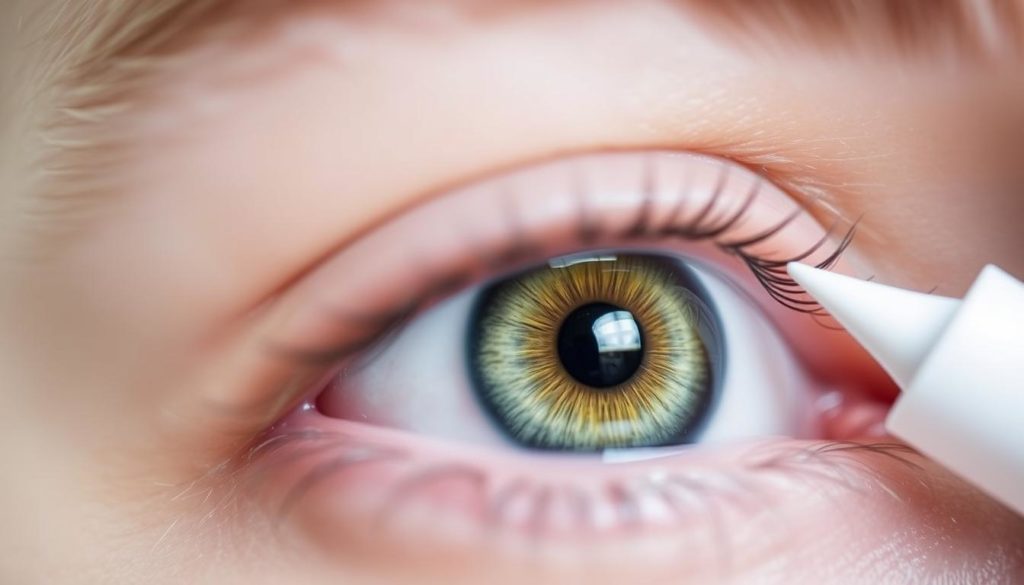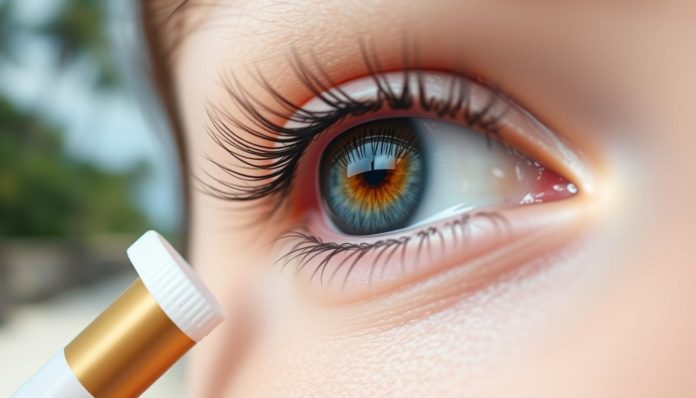Did you know over 30 million Americans deal with dry eye syndrome? This condition can really affect their daily life and work. Eye ointments are a great solution for this issue and others related to eye health.
Whether you need a doctor’s prescription or something you can buy over the counter, the right eye ointments work by delivering medicine right to your eyes. They quickly ease discomfort and help with healing. These ointments dissolve when they touch your eye, creating droplets that stay in place longer. This makes them more effective.
Doctors often recommend using eye ointment at night to prevent side effects like stinging or blurry vision. These ointments are made to tackle various eye problems, from infections to swelling. They are key to keeping your vision at its best.
Introduction to Eye Ointments
Eye ointments are special medicines made to treat eye problems. They work by being applied directly to the affected area. This way, patients see big improvements in their eye health.
They are made with safety first in mind. When applied gently, the medicine starts working fast. This helps keep the eyes healthy.

Eye ointments come in different strengths and types. Doctors watch over them to stop and treat eye issues. This shows how important eye care is for keeping eyes healthy over time.
Health experts or you can buy eye ointments. They are key to good eye health. Using them right gives patients better vision and comfort.
Types of Eye Ointments
Eye ointments are divided into two main types, each for different eye treatments. It’s important to know the difference between prescription and over-the-counter eye ointments. This knowledge helps in using them correctly and getting the best results.

Prescription Eye Ointment
Prescription eye ointment is for serious or ongoing eye problems. It needs a doctor’s diagnosis and should be used with a doctor’s guidance. These ointments often have strong medicines like antibiotics to treat eye issues effectively.
Over-the-Counter Eye Ointment
Over-the-counter eye ointment is for everyday eye issues like dryness or minor irritation. It’s less strong than prescription ointments but still helps with common eye care. It’s a quick and easy way to take care of your eyes.
Common Eye Ointment Uses
Eye ointments are versatile solutions often recommended for a wide range of eye-related issues. They help treat dry eyes, provide eye infection treatment, and relieve irritation. Let’s look at some common uses for eye ointment for irritation and discomfort.
- Antibiotic eye ointments: These are mainly used for eye infection treatment, especially for bacterial infections. They kill the bacteria, lessen symptoms, and help heal faster.
- Anti-inflammatory eye ointments: These are great for reducing swelling and irritation. They can treat dry eyes and ease inflammation after surgery, offering quick relief.
- Lubricating eye ointments: Ideal for treating dry eyes, they mimic the natural tear film. This keeps the eyes moist and reduces discomfort.
The right eye ointment depends on a healthcare professional’s diagnosis. They make sure the chosen ointment works well for the issue, whether it’s infection, dryness, or irritation. Always follow a doctor’s advice for the best results.
Eye Ointments for Treating Infections
Eye ointments are key in fighting eye infections. They come in different types for bacterial, viral, and fungal infections. Knowing which one to use can help you pick the right treatment.
Bacterial Infections
For bacterial eye infections, doctors often recommend ointments with antibiotics. These include neomycin, bacitracin, and polymyxin. These ingredients stop bacteria from growing. This helps you feel better faster and eases symptoms.
Viral Infections
Viral infections need a different kind of treatment. Doctors use ointments with ingredients that target the virus. These treatments aim to reduce the virus’s spread and ease pain.
Fungal Infections
Fungal infections in the eye are not common but can be serious. They are treated with antifungal ointments. It’s important to get the right diagnosis and use the correct ointment to treat them effectively.
Picking the right eye ointment and following your doctor’s advice is crucial. It ensures you get the best treatment for eye infections.
How to Properly Apply Eye Ointment
Applying eye ointment correctly is key for its effectiveness and safety. By following specific instructions, you can get the best results and avoid contamination. Here’s a guide to the proper application technique.
Step-by-Step Application Process
- Wash your hands thoroughly with soap and water to prevent introducing bacteria to your eye.
- Warm the tube slightly by holding it in your hands. This makes the ointment easier to apply.
- Tilt your head back or lie down to ensure the eye ointment is applied correctly.
- Pull down your lower eyelid to create a small pocket between the eyelid and eye.
- Squeeze a small amount of ointment (usually about 1 cm) into this pocket without touching your eye or eyelid.
- Close your eyes gently for 1-2 minutes to let the ointment spread evenly.
- Wipe any excess ointment from around the eye with a clean tissue.
Tips for Best Results
- Avoid touching the tube’s tip to any surface, including your eye, to keep it sterile.
- Follow the exact eye medication instructions provided by your healthcare provider or the medication label.
- Use the correct dosage as prescribed and do not exceed the recommended frequency.
- Store the ointment properly, usually in a cool, dry place, and keep the cap tightly closed when not in use.
Consult with your healthcare provider for any specific concerns or instructions tailored to your eye condition. By following these eye ointment application techniques, you can apply eye ointment safely and effectively. This ensures optimal results from your treatment.
| Step | Action | Reason |
|---|---|---|
| 1 | Wash hands | Prevents contamination |
| 2 | Warm the tube | Makes application easier |
| 3 | Tilt head back | Ensures correct administration |
| 4 | Pull down lower eyelid | Creates a pocket for the ointment |
| 5 | Squeeze ointment into pocket | Avoids contact with the eye or eyelid |
| 6 | Close eyes gently | Allows ointment to spread |
| 7 | Wipe excess ointment | Keeps area clean |
Benefits of Using Eye Ointments
Eye ointments help people with different eye problems. They bring quick and lasting relief. This makes them a top choice for many.
Immediate Relief
One big plus of eye ointment advantages is quick comfort for the eyes. They go right on the affected area. This means fast relief from irritation and soreness.
This quick action is great for sudden eye problems. It’s when you need help fast.
Long-Lasting Effects
Eye ointments also give lasting ocular relief. They don’t need to be applied often. Instead, they keep working for a long time.
This means the medicine stays in touch with your eye for a while. It helps with chronic issues like dry eye syndrome. Using them regularly keeps your eyes comfortable and manages symptoms well.
Eye ointments are key in eye care because they offer quick and lasting relief. They have big eye ointment advantages for many eye problems.
Side Effects and Precautions
Eye ointments have many benefits but can also cause side effects. Common eye ointment side effects include stinging, burning, or temporary blurring of vision. These effects are usually mild and go away quickly. But, if they don’t or get worse, you should see a doctor.
It’s important to be careful when using eye ointments. Knowing about possible allergic reactions to the ingredients is key for ocular medication safety. Always tell your doctor about any allergies or health issues before starting a new eye ointment. This is especially true if you’re pregnant or breastfeeding.
Some substances can interact badly with eye ointments. These drug interactions can make the ointment less effective or unsafe. Always tell your doctor about all the medicines you’re taking. This helps avoid any bad reactions and keeps your ocular medication safety in check.
Here’s a detailed table showing possible side effects and precautions for common eye ointments:
| Potential Side Effects | Precautions |
|---|---|
| Stinging | Avoid driving or using machinery until vision clears |
| Burning | Consult physician if it persists beyond few minutes |
| Temporary blurring of vision | Do not engage in activities requiring clear vision immediately after application |
| Allergic reactions (rare) | Inform doctor about any known allergies |
Eye Ointments for Dry Eyes
Eye ointments for dry eyes help ease the discomfort of dry eye syndrome. This condition causes ongoing dryness, irritation, and scratchiness. These symptoms can really affect your daily life.
Symptoms of Dry Eye Syndrome
It’s important to know the signs of dry eye syndrome to get the right treatment. You might feel like there’s grit in your eyes, or they might itch. You could also notice redness and changes in how well you can see. Finding relief from these symptoms can make your eyes feel better and stay healthy.
Choosing the Right Ointment for Dry Eyes
Choosing the right eye ointment means understanding your symptoms and how bad they are. It’s a good idea to talk to pharmacists or doctors for advice. They can help you find the best dry eye treatment.
For mild cases, over-the-counter options are usually a good start. But if your dry eye is severe, you might need a stronger prescription treatment. This ensures you get the relief you need from dry eye symptoms.
Understanding Eye Ointment Dosage
Knowing the right amount of eye ointment to use is key for treating eye problems. Using the correct amount helps avoid side effects. Too much ointment can cause blurry vision and discomfort, while too little might not treat the problem well.
Doctors are great at giving you the right amount and how often to use it. They consider your specific needs and health. It’s important to follow their advice, whether you’re using a prescription or something you can buy over the counter.
Sticking to the right dosage and frequency of eye ointment helps a lot. Using too much or too little can make eye problems worse. For example, it might make dry eyes worse or block your tear ducts. Always talk to your doctor for the best advice.
FAQ
What are the best eye ointments available for maintaining eye health?
The best eye ointments vary by individual needs. Popular choices help with dry eyes, infections, and inflammation. An ophthalmologist can recommend the best one for you.
How do eye ointments benefit eye health?
Eye ointments put medicine right into the eye for targeted relief. They stay in contact with the eye for a long time. This is great for treating dry eyes and infections.
What are the most common uses for eye ointments?
Eye ointments are used for infections, reducing swelling, and easing dry eyes. They help with both sudden and ongoing eye problems.
How should one correctly apply eye ointment?
To apply correctly, wash your hands first. Warm the tube, tilt your head back, and pull down your lower eyelid. Then, squeeze the ointment into the lower eyelid. This keeps it clean and effective.
What are the differences between prescription and over-the-counter eye ointments?
Prescription ointments are for serious conditions and need a doctor’s diagnosis. Over-the-counter ointments are for minor issues like dry eyes and mild irritation. You don’t need a prescription for them.
Can eye ointments be used to treat bacterial infections?
Yes, many ointments have antibiotics for bacterial infections. They contain ingredients like neomycin, bacitracin, and polymyxin to stop bacteria from growing.
What are the potential side effects of using eye ointments?
Side effects can include stinging, burning, and blurry vision. Most side effects are mild and go away quickly. If they don’t, talk to your healthcare provider.
How often should I apply my eye ointment?
How often you apply depends on your condition and the ointment type. Always follow what your healthcare provider tells you to do. This ensures it works best and is safe.
Are there special considerations for using eye ointment for dry eyes?
Yes, for dry eyes, pick the right ointment based on how bad your symptoms are. Mild cases might just need over-the-counter ointments. Severe cases might need stronger prescription treatments.


